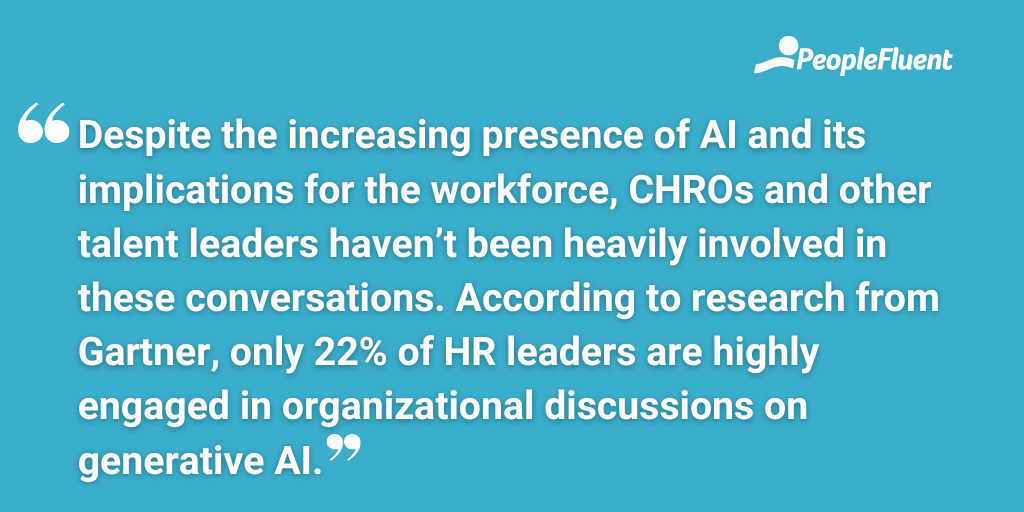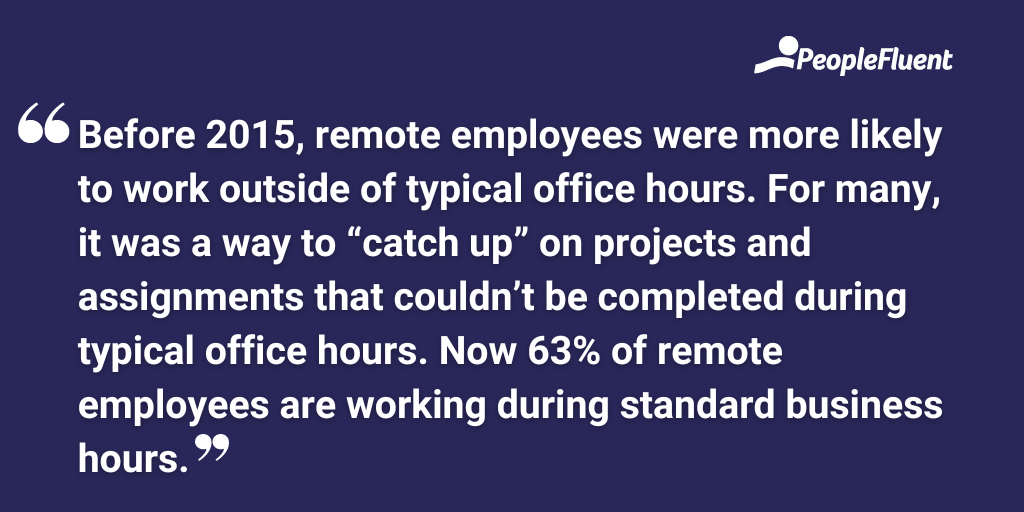Published: Feb 21, 2024Time to read: 7mins Category: Talent Management
3 Trends Impacting Talent and Performance Management
Optimizing employee performance means adapting to changes that affect the professional landscape. In this blog post, get a detailed look at three trends impacting the way enterprise organizations handle talent management.
Talent and performance management are about much more than recruitment, retention, and annual review cycles. HR leaders play a direct role in improving employee experience, shaping organizational culture, and enhancing business results. To do so, talent management teams must embrace the changing professional landscape and be early adopters of innovative technology tools. Adapting to the following three trends will help leaders optimize their talent strategies and achieve positive business results.

1) Artificial Intelligence
Artificial intelligence (AI) is permeating nearly every industry, impacting the way people work and the skills and competencies needed to keep organizations relevant. Advancing technology naturally leads to evolving systems and new job skills demands. Still, the breakneck pace of AI adoption in the workforce is forcing employees and organizations to be more agile than ever before. Recent data shows that the skills employees need for a given position have shifted by around 25% since 2015, but new AI tools may accelerate that rate of change even further, by up to 65% by 2030. The skills and competencies an employee needs to do their job today will likely be vastly different in just six years because of AI.
It’s possible that the vast capabilities of the current wave of AI technologies, especially generative AI, could make workers feel discouraged or concerned about their job security, and those fears aren’t unfounded. Generative AI is likely to disrupt many employees’ jobs, leaving them with a greater sense of urgency to adapt their skills. LinkedIn suggests in its 2023 Future of Work Report that workers with undergraduate and graduate degrees will see greater disruption by generative AI tools, compared to those with high school diplomas and associate degrees. While advanced degrees certainly still hold merit, the tangible and soft skills employees bring to the table—as well as the ability to adapt to rapidly changing business needs—will ultimately be their most valuable assets.
AI will push organizations (and the labor market in general) to adopt skills-based approaches to their overall talent strategies, and degrees will likely eventually hold less weight when it comes to succession planning and skills deployment. Talent management leaders must devise strategies to alleviate employees’ fears and assist them with reskilling and upskilling initiatives. Continuous skills development will be essential to keep companies competitive and support performance goals.
Despite the increasing presence of AI and its implications for the workforce, CHROs and other talent leaders haven’t been heavily involved in these conversations. According to research from Gartner, only 22% of HR leaders are highly engaged in organizational discussions on generative AI. As AI tools continue to directly impact employees and the skills needed to function in their roles, it will be essential for talent leaders to take a more active role in enterprise-wide conversations about how their organizations use and respond to these evolving technologies.

LEARN MORE ABOUT WORKING WITH AI | ‘Artificial Intelligence in HR: Everything You Should Know’
2) Remote and Hybrid Work
Before 2020, remote work certainly wasn’t mainstream. Nearly four years later, remote and hybrid work arrangements are here to stay. According to the Pew Research Center, 35% of U.S. workers with the option to work remotely do so all of the time, and 41% of workers with a remote option have a hybrid schedule. Employees want flexibility and autonomy for their schedules, and organizations are listening. Deloitte’s 2023 Global Remote Work Survey found that 80% of companies have implemented some sort of remote work policy, and 35% of organizations allow their employees to work remotely from other countries. Organizations want to source the best talent with the skills and competencies necessary to achieve business goals, and remote work arrangements eliminate geographic barriers to exceptional employees.
Still, these arrangements present HR leaders with unique challenges. The same report from Deloitte found that 54% of organizations experienced challenges when implementing their remote work policies. While geographic flexibility is great, it can create concerns for organizations regarding taxes and compliance regulations that vary across states, provinces, and countries. Companies also need to consider how their implementation strategies will align with stakeholder and business goals.
Employee expectations and organizational culture also need to be considered. Before 2015, remote employees were more likely to work outside of typical office hours. For many, it was a way to “catch up” on projects and assignments that couldn’t be completed during typical office hours. Now, 63% of remote employees are working during standard business hours. While there’s usually some expectation of flexibility for remote work, organizations need to establish performance guidelines that fit into the company culture.
Whether employees need to work during a specified timeframe each day or they have to log a certain number of hours, talent management teams must have clearly defined expectations and systems in place to track performance metrics fairly and equitably.
HANDPICKED FOR YOU | ‘How Performance Software Can Transform Your Employee Skills and Competency Management’
3) Diversity, Equity, and Inclusion
Prioritizing DEI initiatives is good for businesses. According to a recent report, 90% of companies that invest in diversity, equity, and inclusion (DEI) initiatives see a positive impact on their competitive business positioning. The same research finds that organizations focusing on DEI have seen measurable positive impacts on multiple business initiatives. More specifically:
- 81% credit their DEI strategies with improving the representation of underrepresented groups within management roles.
- 83% say their DEI initiatives improve organizational agility.
- 84% see improved recruitment and retention efforts.
- 84% see an improvement in their ability to understand and engage with customers.
- 86% credit DEI strategies for improving their company’s reputation.
HR leaders need to be actively involved in organizational DEI discussions. People data from solutions like performance and succession planning software, as well as human resource management systems (HRISs), are crucial to aligning DEI initiatives with organizational goals.
Paying greater attention to and being mindful of talent demographics can also help HR teams better understand their current workforce makeup and address potential areas of concern. People data from performance management software can be analyzed to determine whether certain groups of employees consistently outperform others. Analyzing such data can in turn help talent leaders discern why some groups perform better than others so systems can be created to support underperforming groups.
Similarly, people analytics in succession planning software can help HR leaders see trends in employee mobility for diverse groups. Organizations can gain a better understanding of how often employees from underrepresented or diverse backgrounds move into leadership roles or make lateral job changes, as well as how many diverse employees are currently in the pipeline for advancement. With this information readily available, talent managers can be more proactive and make data-backed suggestions in company-wide discussions of DEI initiatives.
Embrace Change to Improve Performance
AI, remote work, and DEI initiatives certainly won’t be the last trends to impact HR functions. Advancing technologies and employees’ evolving attitudes about how work fits into their lives will constantly affect how organizations deploy their performance management strategies. HR leaders have expertise that uniquely positions them to help their organizations plan and implement strategies designed to optimize talent and achieve organizational goals.
Master Your Talent Management Initiatives
Want more tips for optimizing your employees’ performance? Download our ebook, ‘Mastering Talent: Leveraging Technology to Transform Your Performance Strategy and Drive Employee Engagement,’ or request a PeopleFluent demo today to see our performance management software in action.